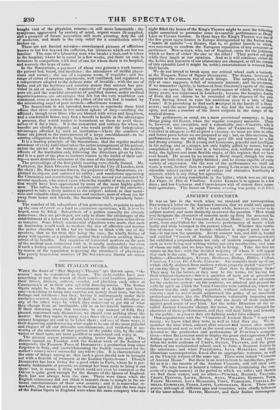THE ITALIAN OPERA.
WHEN the doors of " Iler Majesty's Theatre" are thrown open, "the season" may be considered as begun. The fashionables have now something to vary the round of their tasteless and heartless pastimes ; their drives, dinners, soir6es, scandal, and plucking each other at CROCKFORD'S or in their own splendid drawing-rooms, The Italian Opera might be to them an entertainment of a higher and better castāsomething to bring into exercise not merely their taste, but their feelings and intellects : but they, having it unfortunately under their exclusive control, take care that it shall be as vapid and frivolous as any of the other ways by which they endeavour to get rid of what they chauge from an inestimable gift to an intolerable burdenālime. If their throwing away this treasure, in any manner of folly they pleased, concerned only themselves, we should care nothing about the matter. But they injure in many ways tilos:" elasscs of' society who in current language are said to lie below them ; and one of' these ways, is their depraving and destroying what ought to be one of the most graceful and elegant of all our dramatic entertainments, and rendering it un- worthy of the attention of' that portion of the public who, by the culti- 'ration of their taste, are most qualified to understand and enjoy it. The present season promises nothing better than the past. The theatre opened on Tuesday with the feeblest work of the feeblest of composers, the Torquato Tasso of DONIZETTI; a production long since forgotten in Italy, and (notwithstanding the foolish anyouement for the author's name) never successful anywhere else. It is characteristic of the state of things among us, that such a piece should now be brought out with a flourish of trumpets at the London Opera-house! Though DONIZETTI has been living for a good while in Paris, where he is per- sonally fashionable at present, no attempt has been made to bring it out there: but, it seems, a thing which could not even be ventured at the Odeon is quite good enough for the theatre of the Queen of England. Such has not always been the case. There were times when the English aristocracy did not think it beneath them to mingle in the na- tional entertainments of their own country ; and it is somewhat re- markable, (but we shall not stop to theorize upon it,) that the best days Of the Italian Opera in England were when the same company who one night filled the boxes of the King's Theatre might be seen the following night assembled to patronize some favourable performance at Drum.! Lane or Covent Garden. In those days the King's Theatre was one oe the few great opera-houses in Europe distinguished by the Italian term " teatro di cartello "āa theatre, that is, to gather laurels in which was necessary to confirm the European reputation of any composer or' performer. Now-a-days, who, out of England, cares for the judgment which we form of either the one or the other? They pocket our gold while they laugh at our opinions. And so it will continue, either till the habits and manners of our aristocracy are changed, or till the control of this splendid (and it might be, noble) entertainment is wrested from their hands.
We do not intend to break upon our critical wheel such a butterfly as the Torque to TossĀ° of Signor Dosizorri. The drama, however, is superior to the common run of such things. The subject, which the title at once suggests, is full of romantic interest ; and its treatment, . if we remember rightly, is borrowed from GOLDONI'S opera of the same name,āan opera, by the way, the performance of which, within these thirty years, was suppressed in Lombardy, because the haughty family of EsTE did not choose 'to be reminded of the disgrace of the poet TAsso having dared to raise his ambitious eyes- to a lady of their house It is provoking to find such *subject in the hands of a Don. mem ; and the more provoking, as he has had the luck to stumble upon, and mar, a number of the finest subjects in the range of the musical drama.
The performers, as usual, are a mere provisional company, to keep things going till Easter, when the regular company assemble. There is, however, one exception, and a remarkable oneāComem, who is engaged, we believe, to supply the place of TAMBURINI. Whether COLETTI is adequate to fill so great a vacancy, we must see him in other and better parts befbre we are prepared to say ; but, on this occasion, his performance was the only thing that gave life and interest to a dull and dreary evening. lie is young and handsome, graceful and intelligent in his acting, and as a singer, not only highly gifted by nature, but ac- complished by art. Ills voice is a barytone, and, without any want of body, the lightest and most flexible organ,, of this register, that we have ever heard. Ile seems by no means a florid singer, though his orna-
ments are both rich and highly finished ; and he seems capable of every variety of expression. On the rest of the performance we shall not
waste a word, further than to caution young LABLACHE (who has con- siderable talent) against a sort of vulgar and obtrusive familiarity of manner, which is any thing but agreeable. There was nothing remarkable in the ballet ; which was an old one, Les Pages du Due Sc Vename. FANNY ELSLER is to appear in a few
days ; and her Cachucas and Cracoviennes will of course draw nume- rous spectators. The house on Tuesday evening was pretty well ;ilk&


























 Previous page
Previous page